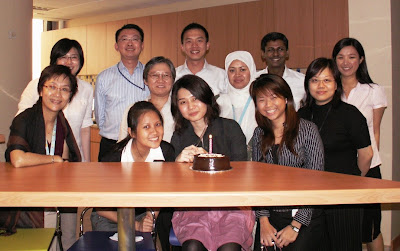*I thought I would make my first post here a flaky one, in the spirit of being 'true to character', but flipping back over GB's last few posts, it wouldn't be right to spoil the current pensive atmosphere with my flakiness so I'll leave that for now and instead present you with what a flaky arts graduate writes when she's trying to be serious.Today I had plans to meet GB and CK for dinner and I thought this would be a perfect opportunity to come in an clean out my 'stuff'. Little did I expect the horror that would await me when I walked to my cubicle - a barren, desolate, sterile space - for a moment I thought I had walked into the wrong cubicle by mistake. No filthy fan, no cheap deskside moisturizer, no dusty candle, no pictures of ridiculous things on the cubicle wall, no frivolous papers on the desk, no used files lying around the floor - this couldn't be my cubicle - but of course it was; my cubicle had been the victim of the overzealous admin staff. (As GB put it, "they couldn't wait to see you gone!")
The truth is, nothing really important had been left at the cubicle. One of two things had practical importance; I had prepared a file of important papers for my successor to refer to, and my bank book had been left in another folder. In the end, objects like these are replaceable. Not quite easily, but still, ultimately, replaceable.
It was therefore a little surprising to me that I was so upset over the whole thing.
Dinner was a nice distraction from my disconcert but it was when I finally got a chance to think about it when I got home, that I realized the reason behind my perturbed spirits.
My 'site of memory' had been erased - Pierre Nora's original concept of the 'lieu de mémoire' refers to "any significant entity, whether material or non-material in nature, which by dint of human will or the work of time has become a symbolic element of the memorial heritage of any community".
Obviously my use of the concept is a bastardization of Nora's original idea, but I believe that they are both in the same spirit. Over time, (11 months is a long time for someone my age), my cubicle and the objects in it had all come to acquire the tint of memory.
The way I cleared out my cubicle was telling. Documents involving work, invoices and suchlike were the first to go; they were the easiest to let go of. Over the week or so that I slowly cleared out my desk, layers of memories were unsettled and dispersed. The last to go, were the objects that I found hardest to take away.
You could say they were the objects that had acquired the hardest accretions of memory. The ticket stubs at the bottom of my drawer from a movie I had enjoyed with someone who had meant something to me. The plastic bags that represented the yet-to-be-resolved inner struggle between the urge to recycle and the equivalent pull towards the apathetic and lazy desire to just throw out everything. The candle given to me by a friend who had insisted that every desk requires a conversation piece; which surprisingly did later on serve as the nucleus of my first conversation with someone who turned out to be a kindred soul.
These were all the memories and more that were taken from me when I came back to my empty cubicle and found myself robbed of a chance to say a last goodbye. More importantly, these were some of my most important ties to the entire 11 month experience. Sitting at my desk, which now felt alien, the weight of everything fell on me - this place, where I had spent a very happy 11 months was not my place anymore.
Of course, I could promise to keep in touch with all my friends, and once in a while, I could probably have gotten someone to sneak me into the building, but I'm fooling myself if I believe it can ever be the same. C'est la vie?


